河南省夏邑县高级中学高中英语必修三《Unit9 lesson1 On Your Bike》导学案
- 格式:doc
- 大小:40.00 KB
- 文档页数:3
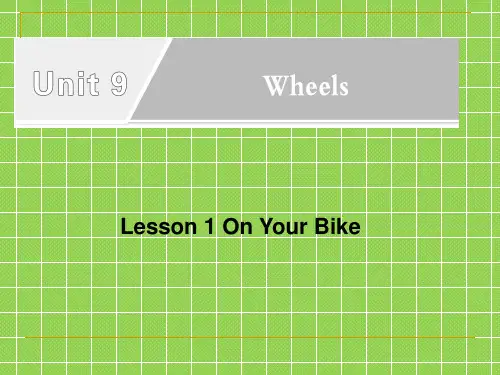
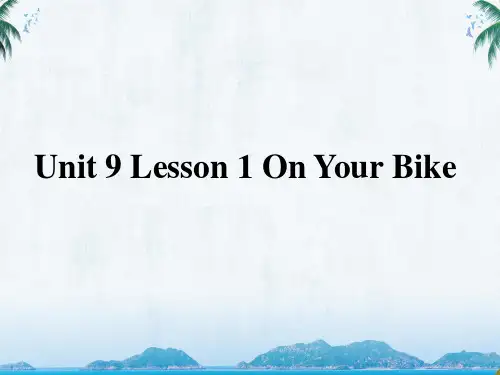
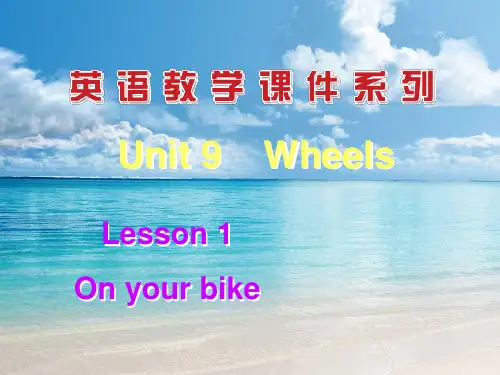

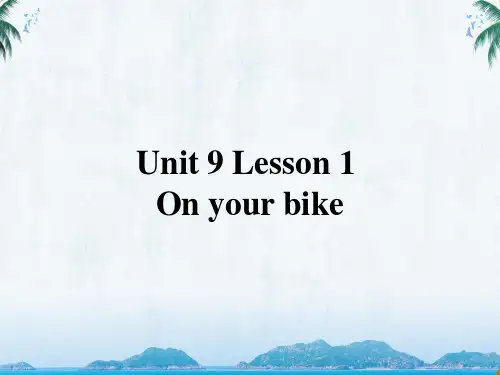
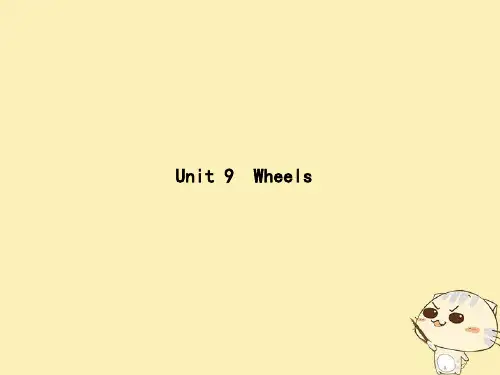
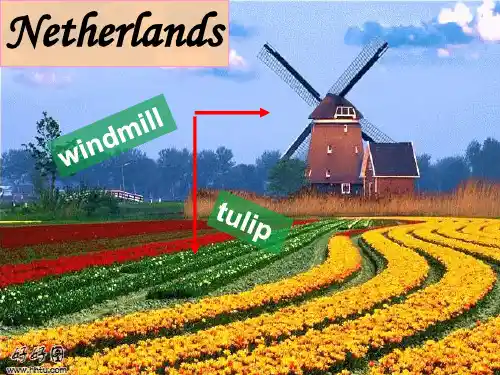

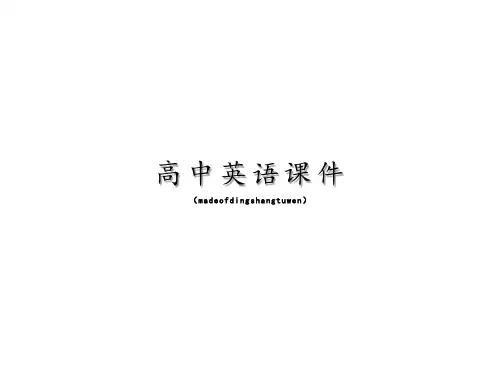
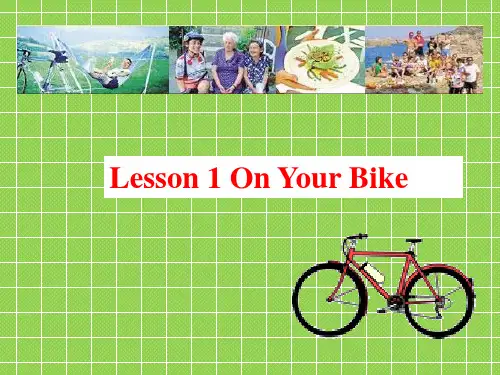
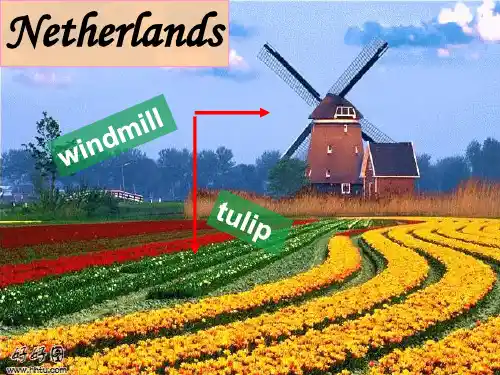
高中英语学习材料madeofjingetiejiUnit 9 Lesson 1 On Your Bike教学设计教材分析本课是第9单元的第1课,主课文介绍了阿姆斯特丹白色自行车的发展过程。
本课的教学设计分为两个课时。
第一课时侧重对课文的理解,引导学生理出事件的发展脉络,提取文章的主要信息和细节信息,并在整理信息的过程中,引导学生发现分析问题和解决问题的思维过程,最后结合课文的信息和语言进行输出性活动。
第二课时在对课文进行复习的基础上,引入本课的重点内容——现在完成进行时,通过分析例句,体验、发现并总结该语法的形式和语意功能,并在不同层面的活动中,进一步体会该语法的语意功能,最后初步运用现在完成进行时进行表达。
第二课时的难点在于理解现在完成进行时的语意功能,而不是语言形式。
在目前阶段,学生能够运用这一语法解释重复或持续性动作对目前造成的影响即可。
教学内容话题:阿姆斯特丹白色自行车的发展过程(阅读)词汇:重点词汇:benefit, flat, convenient, convenience, therefore, path, park, transport, neighborhood, chip, insert, thanks to, fed up相关词汇:hopeful, thief, indeed, consequence, arrest策略:通过标题预测课文内容;通过略读获取主要信息;通过细读提取细节信息;通过上下文理解词汇语法:现在完成进行时第一课时First Period教学目标:在本课学习结束时,学生能够:1.理清课文的发展脉络;2.获取白色自行车发展过程的细节信息;3.谈论阿姆斯特丹的白色自行车;4.体会使用自行车对环境和交通的意义,并试着设计北京的公共自行车。
教学过程教学活动Activities 设计意图Intentions互动模式&时间IP & timeWarm-upStep 1T asks Ss if they ride bicycles, when they ride bicycles and why they use bicycles.1. 调动学生已有知识。
北师大版高中《英语必修模块 3》Unit9Lesson1OnYourBike 教课方案一、整体设计思路、指导依听说明在英语学习过程中,听、说、读、写作为系统掌握语言知识必不行少的四项技术,每一项都占有重要的地点 .此中,写作是英语表达的门路,也是真实掌握英语的必备技术 .在英语教与学的过程中,假如学生没有足够的语言基础知识,那幺他的写作就会成为无水之鱼,空洞且乏味 .反过来说,只有让学生在进行写作以前掌握大批的语言知识,学生才能依据已有的知识写出一篇内容丰富、表达正确、富裕思想的作文,而这正切合了外语教育语言学中语言输入( input )和语言输出( output )的理论 .以整体语言教课理论为基础,设计北师大版高中《英语(必修模块 3)》unit 9 lesson 1 “on your bike 的”讲堂教课活动 .本课介绍自行车王国——阿姆斯特丹的过去和此刻,文章生动风趣,主题与学生的平时活动密切相连,有阅读价值 .课文有必定量的生词,难度适中.经过观看视频、脑筋风暴、泛读与精读、小组议论等形式,让学生较好地理解与掌握本篇文章,接下来教师进一步联合近些年来晋江市交通方面发生的变化,对学生进行写作指导,最后形成以“读”促“说”、以“说”带“写”的教课模式 .二、教课背景剖析1 教课内容剖析课文来自北师大版高中《英语(必修模块 3)》第九单元第一课“on your bike ”文章. 短小精练,词汇简单易懂,话题吸引学生,与学生的平时活动息息有关,适合教师透过文本充足发掘其内涵,设计出适合的“读”“说”“写”活动,睁开整体语言教课活动 .本课作为整个单元的第一课时,是本单元“wheels”这个主题的重要构成部分,该文属于环保节能型文章,经过倡议节能环保的实践活动,达到教育、培育学生节俭能源、保护地球、爱惜环境好习惯之目的 .2 学生状况剖析学生主体为高一年级学生,经过前面 2 个模块的英语学习,已有比较清楚的英语学习目标,已经能从一般的文字资猜中获取主要信息,能利用上下文和句子构造猜想词义;掌握必定的词汇量,并能在教师的指导下选择适合的阅读策略;阅读英语文本以后,可以比较顺利地睁开议论和写作,做到“有话可说”“言之有物”.三、教课目的剖析1 知识与技术(1)能从阅读资猜中获取所需信息,如阿姆斯特丹 the “white bike ”的过去与此刻 .(2)能依据阅读中所获取的信息以及北京和阿姆斯特丹的图片比较来描绘自己所喜爱的生活方式 .2 能力目标(1)经过指引学生对文本构造的解读,培育学生剖析资料、提守信息、发现问题和解决问题的能力 .(2)经过指引学生做小组讲话,培育学生组织语言、运用语言的能力.(3)经过创建情境,要修业生给朋友回邮件,介绍近些年来晋江的交通变化,提升学生的写作能力 .3 感情目标(1)激发学生对外国文化学习的兴趣,拓展学生的视线 .(2)培育学生的合作精神,能主动与同桌沟通分享信息,共同达成学习任务 .(3)培育学生建立起节俭能源、保护地球、爱惜环境的好习惯 .四、教课重难点剖析1 教课要点(1)经过表格填空的方式,指引学生解读文本构造、理清文章脉络.(2)指导学生经过 fast reading 和 detailed reading 等方法获守信息、办理信息,掌握文章要旨 .(3)在掌握文章粗心、文本构造的基础上,用英语叙述自己喜欢的生活方式 .(4)鉴于本节课所学的内容,联合实质,设计写作任务,将家乡这几年的交通变化用书面的形式表达出来 .2 教课难点(1)指引学生将所学过的词汇和表达法自如地应用到实质写作中.(2)掌握经过上下文猜想词义的方法 .五、教课过程设计步骤 1:warmupquestions :(1) do you use a bicycle ? when ?(2) what are the advantages of bicycles over cars ?【设计企图】现代人的出行方式各种各种,飞快发展的交通为人们带来便利的同时也带来了许多问题,教师以漫绘图片的形式将这些问题生动形象地显现出来,更好地惹起学生的共识、吸引学生的注意力、活跃讲堂氛围,为导入后边的阅读做好铺垫 .task 2 :watch a short clip of video of the netherlands and answer two questions then welcome students to the capital of the netherlands —amsterdam , which is called the city of bicyclesquestions :。
I. 知识目标:1.Review the knowledge which we learned last period.2.Learn some new words.3.To read a newspaper article and understand the Main pointsII. 预习检测:英汉互译1.thanks to2. be good for3. with clothes on4. plenty of5. 在20 世纪60年代6. 不愉快,厌烦7. 锻炼,健身,计算出8. 对……..产生影响9. 交通阻塞10. 与某人辩论某事III. 情境导入:To learn these new words and phrases, and do some exercises..IV.核心单词:1.convenient/conveniencea.It is convenient for him to pick you up this evening.b. Could you help me with my English if it is convenient to you.c. Come whenever it is convenient to you .d. Come and see me at your convenience.用法总结:•_______________‚_________________③_____________________2.paint a.She decided to paint the walls white. b.Doors are often painted red.用法总结:•_______________‚_________________3.allow doing sth./allow sb. to do sth.a.We don’t allow you to smoke here.b. We don’t allow smoking in the readingroom. c. You are not allowed to smoke here.用法总结:•_______________‚_________________③_____________________4.wherever/whoever/whatevera.He will take his son wherever/no matter where he goes.b.Whatever/no matter what you say, I’ll go there.c.Whoever comes will be welcome用法总结:•_______________‚_________________5.表语从句:a.The problem was that we have no money .b.That is what he said.c.This is where the great writer used to live.d.The problem is whether he hasknown the news.用法总结:•_______________‚_________________③_____________________6.benefit from sth/be of benefit to sb.n. 利益,好处;vt. 有益于,有助于;vi. 获益,受益于(常与from连用)a.Exercise benefits our health.b.The plants benefited from the rain.c.The plants got much benefit from the rain.d.The sea air is of great benefit toyou . e.I did it for his benefit/for the benefit of him用法总结:•_______________‚_________________③_____________________7. fed up (表语形容词)不愉快的,厌烦的;厌倦的;沮丧的a. I was fed up with waiting for her.b. She was fed up with her exam results.用法总结:•_______________‚_________________8. as a consequence of/as a result of/in consequence ofin consequence/as a consequence/as a resulta.As a consequence of warning, nobody was hurt.b.He didn’t practice, and as a consequence he lost.用法总结:•_______________‚_________________V.达标测试:1.More than 200 people died ________ the air crash.A.as a consequence ofB. becauseC. as a resultD. in connection withe and see me whenever _________.A. you are convenientB. you will be convenientC. it is convenientD. it will be convenient to you.3. This tree looks tall and strong but ______its trunk is hollow.A. actuallyB. trulyC. reallyD. surely4. The book is of ________ benefit ______ us.A. great for;B. much forC. very toD. great, to5. The famous actor keeps fit by ____for an hour every morning.A. working outB. carrying outC. turning outD. making out6. ________ team wins on Saturday will go through to the national championship.A. No matter whatB. No matter whichC. whateverD. whichever7. We had wanted to finish our task by noon, but it didn’t quite ______ as planned. A. find out B. give out C. hand out D. work out.8. Progress so far has been very good. ________, we are sure that the project will becompleted on time.A. HoweverB. OtherwiseC. ThereforeD. Besides9. The famous scientist grew up __________ he was born and in 1930 he came toshanghai. A. when B. whenever C. where D. wherever10. We don’t allow ________ in the room, so we don’t allow you ______ here, too.A. to smoke; to smokeB. smoking; smokingC. smoking, to smokeD. to smoke, smoking11. ——Allan is a wise person. ——But in my opinion, he is _______ than wise. A.clever B. braver C. more brave D. less brave12. __________ the new policy, we are now having a happy life.A. Thanks toB. BecauseC. because ofD. thanks for13. _______waiting for her,he usually went straight home on his own.A.fed up withB. be fed up withC.being fed up withD. was fed up with14.The peasant have decided to build a reservoir (水库) ,__________ the difficultymay be. A. however B. whatever C. whichever D. whenever【答案】: 1——5:ACADA 6——10:DDCCC 11——14:CAAB。